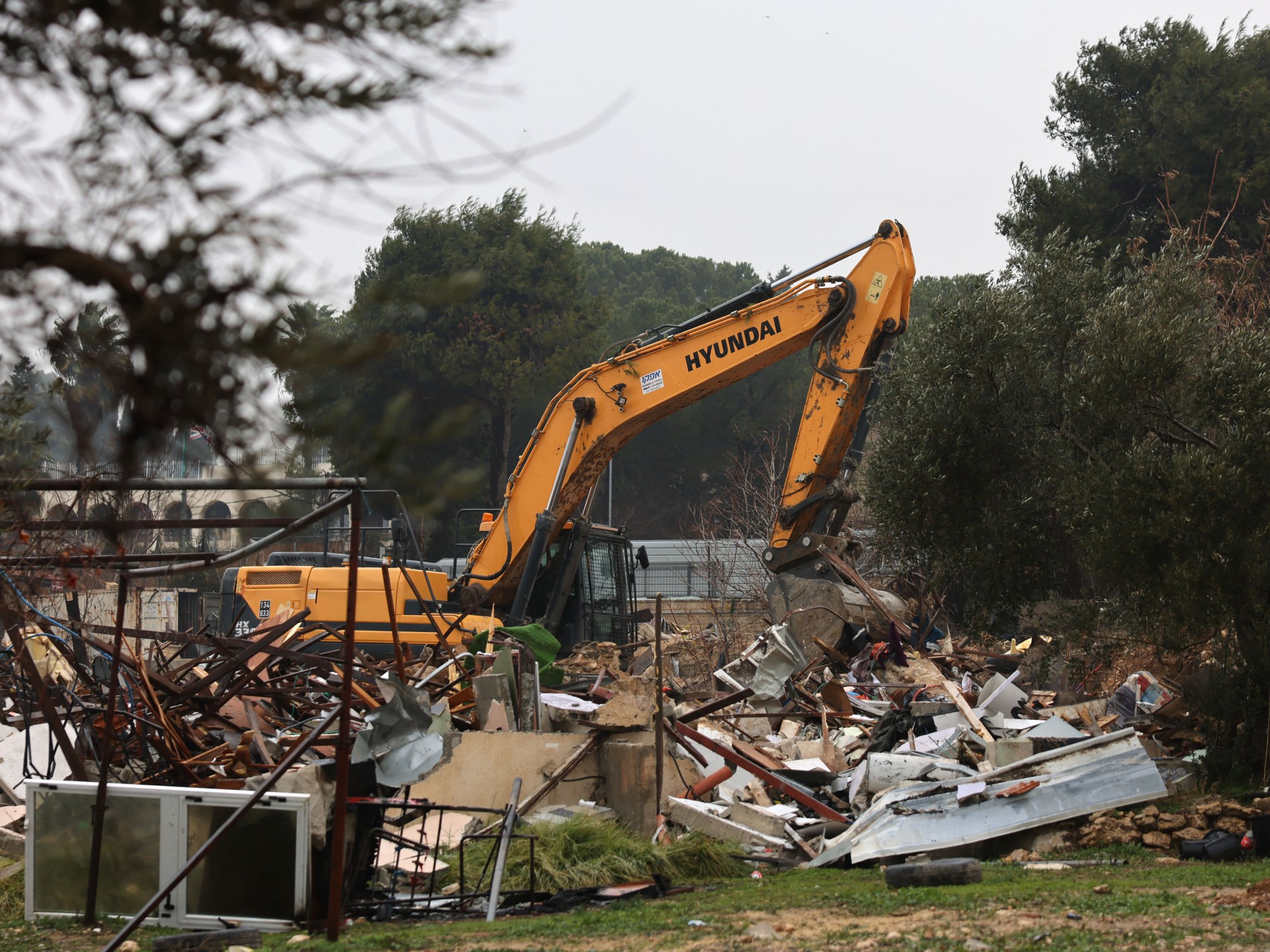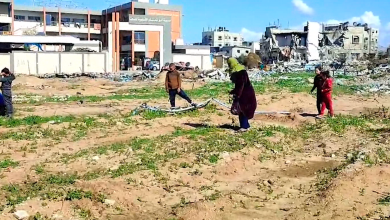With all eyes on Gaza, Israel steps up demolitions of Palestinian homes | Occupied East Jerusalem News

Occupied East Jerusalem – Fakhri Abu Diab had no time to pack his belongings when the Israeli authorities arrived on his doorstep in occupied East Jerusalem on February 14. The police first evicted his family and then ordered a bulldozer to demolish his home.
“All of my memories were in that house,” said Abu Diab, 62, who was born and raised in that home. “I even had a picture of my mother holding me as a child. It was hanging on our wall, but now it’s gone.”
In the wake of Israel’s devastating war on Gaza, the Jerusalem municipality has stepped up home demolitions on the east side of the city, which Israel annexed from the occupied West Bank in 1967 and where most of Jerusalem’s 362,000 Palestinians live.
During the first nine months of 2023, Israel demolished a total of 97 Palestinian homes. But 87 homes have been bulldozed in East Jerusalem since Hamas’s deadly attack on Israeli communities and military outposts in southern Israel on October 7 last year, according to Ir Amim, a local non-profit which monitors home demolitions and advocates for Palestinian rights.
The acute uptick in demolitions suggests that Jerusalem’s municipality is exploiting the global attention on Gaza, where nearly 30,000 Palestinians have been killed, to try and uproot more Palestinians from East Jerusalem, activists and experts say.
“These [demolitions] are done under the guise of law enforcement – as if it is a bureaucratic measure – but it is actually a form of state violence and it serves as a mechanism of Palestinian displacement to drive them from the city,” said Amy Cohen, the director of international relations and advocacy for Ir Amim.
Systemic violence
Israel justifies demolishing Palestinian homes in East Jerusalem by claiming that they have been built without permits. The municipality typically only allows majority Jewish neighbourhoods to build new homes.
The legal discrimination has forced Palestinians to build without permits, rendering 28 percent of Palestinian homes in East Jerusalem “illegal”.
The Israeli authorities have issued orders to demolish most of them, according to Daniel Seidemann, an Israeli lawyer who specialises in legal and public issues in East Jerusalem.
“Before the war, there were roughly 20,000 outstanding demolition orders and those orders never expire,” Seidemann told Al Jazeera.
Home demolitions are prohibited under international law unless they are necessary for military operations. But Omar Shakir, the Israel-Palestine director of Human Rights Watch, said that Israel has created a legal structure to allow it to demolish Palestinian homes.
“There are different mechanisms (to enforce demolitions), each of which ultimately furthers the same objective of forcing Palestinians off their land and maximising land for Jewish Israelis,” he told Al Jazeera.
Since October 7, Seidemann said Palestinians in East Jerusalem have become noticeably more afraid of losing their homes. He cited the perceived increase in racist rhetoric and violent harassment that Israeli politicians and security officials have shown Palestinians.
“The tense atmosphere at the moment is causing [Palestinians to think that] if they have a demolition order, then their home could be [destroyed] next,” he said.
Sending a message
The demolition of Abu Diab’s home has compounded this fear, experts and activists say.
Abu Diab, is, himself, a human rights activist and the elected spokesperson of Silwan, a district that represents about 60,000 Palestinians in East Jerusalem. Residents trust him to speak out against home demolitions and other forms of systemic discrimination that Palestinians face from the Israeli occupying authorities.
“This is not the first time that the Israelis have targeted him,” said Angela Godfrey-Goldstein, the Israeli co-director with Abu Diab of Jahalin Solidarity, a local organisation trying to prevent the forced displacement of Palestinians. “He was put in prison on one occasion and, another time, his son was arrested. The message was to ‘Tell your father to shut up’.
“I asked Abu Diab after [Israel] demolished his house if he would stop speaking out. He said, ‘I’ll speak out even more now,’” Godfrey-Goldstein told Al Jazeera.
Palestinian and Israeli activists believe that advocacy to protect Palestinian homes is needed now more than ever. With municipal elections approaching on February 27, Abu Diab believes that candidates may be deliberately calling to demolish more homes to appeal to their constituents.
He said he fears that the far-right candidate, Arieh King, who is currently deputy mayor of Jerusalem, could become the next mayor. King has previously stated that he aims to limit the building of Palestinian homes in order to protect Israel’s character as a Jewish state. In December, he posted on X, calling Palestinians “subhuman”.
“If King becomes the next mayor in the coming elections, the situation will become quite difficult. He has openly threatened to demolish Palestinian homes and kill Palestinians,” said Abu Diab.
‘There will be a reaction’
Abu Diab said that he owes his life to Godfrey-Goldstein and other activists for quickly notifying journalists and human rights organisations when the police stormed his home. He believes the police may have seriously injured or killed him had it not been for those arriving to video the demolition.
“My wife was sleeping when about 20 or 30 officers stormed in. We are traumatised from what we experienced,” he told Al Jazeera.
But while Abu Diab survived, he and his family – children and grandchildren – are now homeless. He told Al Jazeera that he is sleeping in the homes of friends and relatives in his community, often moving from one residence to another.
Abu Diab is also concerned that he may not be able to afford the demolition. Israeli authorities typically require Palestinian residents to pay for the bulldozing of their homes as well as the salaries of police officers who are deployed to evict residents and secure the premises.
Abu Diab expects the total bill to amount to $20,000 or $30,000. However, his immediate priority is to try and find a new home for his grandchildren, who are too young to understand why they are homeless.
His two-year-old granddaughter recently asked him why the police destroyed their house. He said he had no idea how to answer.
Although he’s trying to remain strong for his family, Abu Diab worries about the future, and warned that Palestinians in East Jerusalem will eventually erupt in anger if Israeli authorities continue to step up home demolitions.
“There will be a reaction,” he told Al Jazeera. “People can’t stand this for long.”



